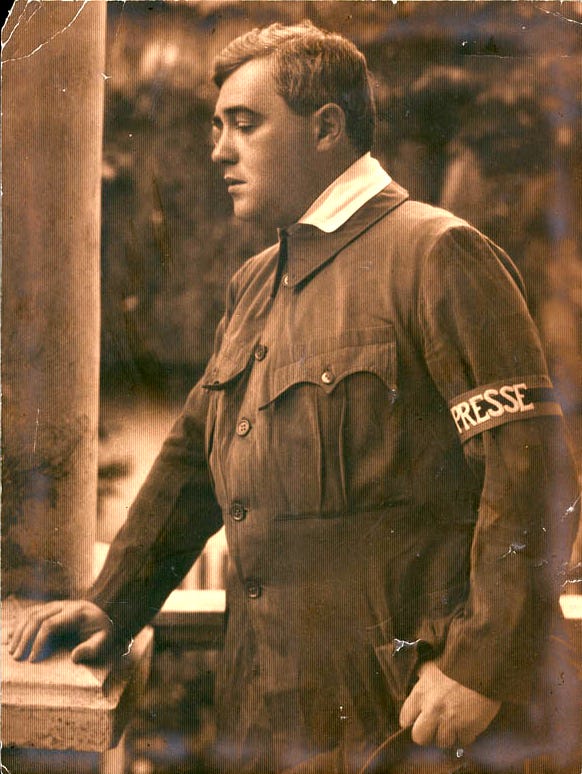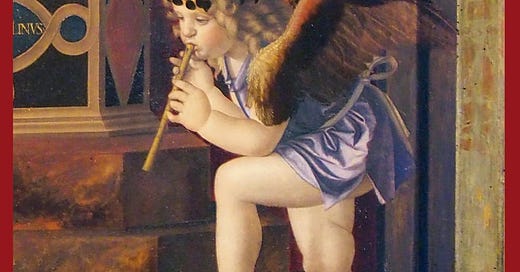Review: Venetian Angel by Ferenc Molnár (translated by Annabel Barber)
Alex Faludy ponders a little-known work by a giant of Hungarian literature.
Ferenc Molnár (1878-1952) was one of 20th-century Hungary’s most internationally renowned authors and dramatists.
Rogers and Hammerstein’s Broadway and (later movie) hit Carousel 1945/1956 adapts Molnár’s Hungarian language play Liliom (1909). Molnár’s classic children's’ novel The Paul Street Boys (1906) has been translated into over 40 languages and filmed repeatedly in Italian, English, and Hungarian.
Venetian Angel (1933), translated here by Annabel Barber (who also supplies helpful notes), is one of Molnár’s lesser-known works, even among Hungarians. As his grandson Mátyás Sárközi notes in a foreword, in 1933 the Atheneum publishing house asked Molnár for a new novel and he “submitted a manuscript without much of a story, its title inspired by a little flute blowing angel at the bottom of Bellini’s Madonna in the Friari church in Venice”.
Venetian Angel, set in the year of its composition, isn’t a grand novel of ideas nor an edgy modernist experiment in style. Yet, it’s still a novel of charm and interest.
The charm derives chiefly from the vivid evocation of an Italian setting which the well-travelled Molnár knew intimately. The interest, at least for those curious about Molnár’s homeland, comes from tell-tale glimpses of the 1930’s Hungarian background hovering just behind the Venetian scenery. Metaphorically speaking the Danube, often referenced in the text, defies geography and flows into the Lagoon.
The pith of the story is a love triangle between three Hungarians abroad: Irma the spoiled daughter of a Hungarian politician and financier; Aurelian, her father’s former secretary, now clerking in a Venetian bank; and Judith, nurse to Irma’s quasi-invalid mother.
The novel’s psychological thrill comes chiefly through Molnár’s convincing depiction of Irma’s heady late adolescent cocktail of hopeless infatuation, nascent eroticism, and self-defeating inclinations. The latter tip over into a destructive vortex —one which threatens to ruin not only Judith (on whom Irma seeks jealous revenge) but, through mishap, Aurelian as well.
Events unfold before us along the sides of Venice’s canals, yet the characters carry a ‘Hungarian World’ with them. Most obviously that’s so in the use of language which at key moments renders their exchanges impenetrable to outsiders: allowing them to live in a ‘world within a world’ among other characters.
More subtly Hungary is present in the events, distant in space and time, which make the characters what they are and determine their behaviour.
One of the things that binds Aurelian and Judith together is their distressed gentility. Aurelian’s valuable family ring contrasts with his lowly present employment and lodging in a cheap pension. Judith has turned to nursing following her family’s financial ruin.
Although Molnár doesn’t labour the point both are clearly typical products of the widespread and sudden precarity experienced by Hungary’s gentry and official classes amid imperial collapse and post-war economic trauma.
Class is more a theme than race here but there are some interesting sidelights on the latter. Mr. Lietzen, a financier and bearer of a German name complains, perhaps too loudly, “Good Christian that I am, I’ve adopted a Jewish profession”.
One wonders if Lietzen’s barb is a case of “the lady doth protest too much”—a wry reflection by Molnár on the known interwar tendency among converted Hungarian Jews to adopt elements of anti-semitic discourse. Thereby they hoped to put distance between themselves and their origins: to ‘pass’ more easily in the gentile world in which they sought acceptance.
These were dynamics, painful to recall, which Molnár knew well. Like many middle-class Budapest intellectuals, he came from a German-Jewish background (his surname at birth was Naumann). Four years after completing this book rising antisemitism in Hungary pushed him into exile in the United States (1937).

This take might be an overreading. After all in the 1930s many non-Jewish Hungarians also bore German names —thanks to the presence of the large ‘Swabian’ and ‘Saxon’ populations within the borders of historic Hungary. Also, the Lietzens are not notably ‘coded’ as Jewish in other respects.
Yet, even so, one plausibly sees in Molnár’s rendering of the Lietzens experience among the Hungarian aristocracy if not a direct depiction then at least a transposition or echo of the fraught dynamics of assimilation he knew first hand.
In the Lietzens arriviste struggle for acceptance in a social world to which they don’t historically belong, they or at least Irma’s father Mr. Lietzen, are always straining to ‘fit in’. While Leitzen is a backbench MP his overly effusive praise of the Prime Minister, Count István Tisza is disdained by the latter. At his country retreat Lietzen
assiduously and tactfully cultivated a good rapport with his neighbours. The neighbours appreciated this and were forever finding things to sell him: a lame old horse for an exorbitant sum a dinner service (a bit chipped here and there, it was true but still genuine Herend porcelain); a couple of barrels of wine (even sourer than the stuff he produced himself); an original sketch by Munkácsy, so blackened and foxed that it was impossible to tell whether it was a young horse-tamer drinking at an inn or an old widow mourning her dead husband. Lietzen knew full well what he was buying, He never haggled….
These observations make the novel sound heavier than it is. At its best its conjuring of Venice’s art and architecture verges on the hypnotic. Molnár’s experience as a court reporter adds the thrill of a police procedural to moments in the book's later pages where a fake ‘crime’ is first confected and then exposed. His depiction of Irma’s adolescent gaucheness makes us cringe with mixed horror and amusement at its plausibility.
Venetian Angel is not on a level with Molnár's better-known pieces. Nonetheless, it rewards the reader in the glimpse it affords into its creator’s mental world.
Venetian Angel by Ferenc Molnár (Blue Danube, 2024) trans. Annabel Barber.
Alexander Faludy





